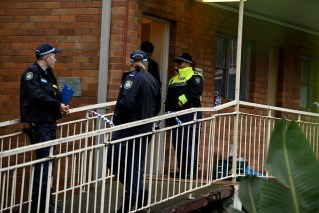Lambie opens public voting on refugee bill to give ‘the real world’ some say in politics


Senator Jacqui Lambie has opened public feedback on the asylum seeker bill. Photo: Getty
The final outcome on a controversial proposal to strip mobile phones from asylum seekers in Australian detention centres could come down to the result of an online poll, with swing vote senator Jacqui Lambie calling for public feedback on how she should cast her deciding ballot.
The federal parliament has been considering the Migration Amendment (Prohibiting Items in Immigration Detention Facilities) Bill 2020, which would give guards more power to search detainees and seize a wider range of banned items, including drugs and weapons.
Of most concern for refugee and asylum seeker advocates, however, is the potential for detainees’ phones to be confiscated.
Acting immigration minister Alan Tudge pointed to a detainee being found with vast quantities of child exploitation material on their phone as a reason the bill was needed. However, refugee advocates say phones are a vital communication and mental health lifeline for people stuck far from their families, and a crucial tool for exposing poor conditions or abuse in detention centres.

The poll on Lambie’s website. Photo: Supplied
The bill is before the Senate, and Tasmanian Senator Lambie is considered the critical vote that will decide whether it passes or fails.
During the last parliamentary sitting fortnight, her office was inundated with emails and calls from opponents of the bill, as refugee advocates urged supporters to voice their concerns. Now, Senator Lambie has asked the public for feedback, opening up a portal on her website where people can register their position on the bill via a simple poll, and give detailed comments.
“People say that, in our system of democracy, we elect people to make decisions using their judgment, not just doing whatever the public tells them to. I agree,” Senator Lambie told The New Daily.
“I’m just asking the public what they think. I’m not asking them to do my job for me. I’m asking them, ‘if you were in my shoes, what would you do?’.”
The same refugee groups that swamped her office with pleas to vote the bill down the first time are mobilising to get supporters to register their thoughts on the Senator’s new poll.
Tweet from @Kon__K
Jana Favero, of the Asylum Seeker Resource Centre – which has vehemently opposed the proposed bill – said the senator’s plan was an “interesting approach”.
“We have spent years and years encouraging people to make contact with elected representatives on the issue of humane treatment for people seeking asylum and refugees. It’s not much different from us telling people to phone their MP, it’s just a more interesting way of doing it,” she told The New Daily.
“Jacqui is often going to be in the spotlight as a crucial vote around issues and I think a lot of Australians have lost a bit of faith in whether elected representatives truly represent the public view. Full credit to her for getting people’s opinions.”
Ms Favero said the ASRC and other progressive advocacy groups had recently gathered 150,000 signatures on a petition opposing the bill, and that she “wouldn’t be surprised” if Senator Lambie’s office had been similarly inundated with opposition so far.
Senator Lambie wouldn’t reveal which way the poll results on her websitewere leaning, but said she was carefully considering each submission. One media report on her proposal said she was “outsourcing” her decision to the public – a characterisation she rejected.
“I don’t think we have anything to fear about asking people to have a say. And if I wasn’t a politician, I’d want to elect a politician who gave a damn about what I thought,” she said.
“It’s not about outsourcing my responsibility to make the call. It’s about giving everyone input into how I make that call in the first place. Most politicians’ decision-making process on how to vote begins and ends when they’re told how to vote by their leader. The public is locked out of that from day one. I’m trying something different.”
On her Facebook page, she joked that “People always say the Senate’s full of unrepresentative swill. I’m trying to use the balance of power to be as representative as I possible can be.”
Senator Lambie said her final decision would not be made solely by the number of votes either way, but that she would consider the feedback in making her final decision. However, she said she was also filtering out submissions from people using ‘fake’ email addresses or details, as well as giving stronger weighting to the thoughts of her Tasmanian constituents.

Senator Lambie said there was “misinformation” about the bill. Photo: ABC
She claimed public discussion around the mobile phones bill was filled with “conspiracy theories”, and took a veiled swipe at both sides of the debate.
“There’s just heaps of misinformation floating around about the bill,” she said.
“The Coalition are out arguing this is about preventing criminals from committing crimes, and the ALP and the Greens are arguing this is about stripping refugees of access to lawyers, family and media. As with most of these issues, the public arguments are really dumbed down.”
“But if the major players in this debate are insisting on running it through the media, I’m asking the public what their experience of those public arguments is.”
Senator Lambie is not the only federal politician asking the public for more detailed feedback on a bill. Labor MP Dr Andrew Leigh has joined with the University of Canberra’s Centre for Deliberative Democracy on a project called ‘Connecting 2 Parliament’, where he will host town hall forums on an upcoming vote on mitochondrial donation – a treatment associated with IVF, to prevent parents passing on mitochondrial disease to their children.
Dr Leigh’s vote on the bill “will be guided by a deliberative democracy process, drawing on the thoughts and insights of residents”, according to the university.
Tweet from @DrDemography
Senator Lambie said she had run a similar public consultation process on a recent bill to limit transactions made by cash, and appreciated the feedback. She said she would “absolutely” poll the public on controversial legislation again.
“Politics has a way of detaching you from the real world, and I’m trying to make sure the real world has a way of busting its way back into it,” she said.








